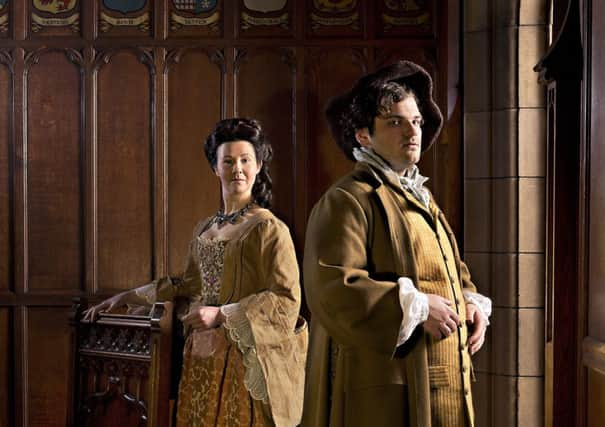Tim Barrow’s new play on 1707 Act of Union


AMONG the lawyers and politicians in the coffee houses of the Canongate, and among the drinkers in dingy howffs down Old Town closes, the topic of conversation is one and the same: Scotland and England – are they better together or better apart? It’s 1706 and there is a choice to be made.
Today, few Scots know much about the Act of Union, passed in 1707, which formally joined Scotland and England. Put another way, the Scottish Parliament did what few political institutions had ever done – it voted itself out of existence. When actor and playwright Tim Barrow began to research the subject, the story surprised him at every turn. “You’re thinking: ‘Why don’t we know this? Why isn’t this period taught in schools?’” he says. “I felt incredibly ignorant.”
Advertisement
Hide AdHe hopes his play, Union, which opens at the Royal Lyceum Theatre in Edinburgh on 20 March, will be a history lesson, albeit one wrapped up in colourful drama and larger-than-life characters. People like Daniel Defoe, who later in life would be known for his novel Robinson Crusoe, who was in Edinburgh in 1707 as a spy for the English Prime Minister. With him is a cast of scheming politicians and military heroes, poets and prostitutes. And Allan Ramsay, wig-maker and wannabe writer, penning pamphlets and falling in love.
“As soon as I started writing, I knew this play had to move between Edinburgh and London, and between the classes as well, from the Palace of Kensington to the darkest tavern on the Royal Mile. I’ve done a lot of research but it’s also a dramatic imagining of the times. I have no idea what Allan Ramsay would have said in a pub to his mates, but I can imagine based on his writings. Or what would happen if he and Daniel Defoe met – they’d probably get on really well and have a pint. I think the great thing about drama is having freedom to explore.”
Barrow, 35, trained as an actor at Drama Centre in London. Union is his second play. His first, Guy, was staged at the Pleasance Theatre in London in 2006. As well as acting in theatre and on television, he has written, produced and starred in two low-budget films: The Inheritance, a Scottish road movie, which won a prize at the British Independent Film Awards; and The Space Between. It was his film work which brought him to the attention of Lyceum artistic director Mark Thomson, and as the political situation in Scotland evolved, Barrow realised the time had come to dust off the play he had written while living in London in 2008.
After a rehearsed reading at the Lyceum, Thomson commissioned Union, and Barrow found himself in the Lyceum rehearsal room watching actors such as Tony Cownie and Keith Fleming speaking his lines. “It’s a huge honour,” he says. “I’ve been going to the Lyceum since I was a kid, I love theatre, that’s what made me want to be an actor.”
Barrow makes no secret of the fact that he supports a Yes vote, but says the play doesn’t take sides. “Audiences are not interested in a political polemic, they just switch off. The story is all important, and I’ve failed in my job as a playwright if this is simply what Tim Barrow thinks about the forthcoming referendum.” At the same time, Union is given an electric shock of urgency by the political context. “Maybe it’s good to go back to a time when Scotland was an independent country and was considering giving that up, in a year in which we may be doing the opposite.”
He believes audiences will be surprised, as he was, by the complexities surrounding the Act of Union: religious controversies; financial collapse after the failure of the Darien expedition; significant sums of money offered by the English government; the proliferation of personal bribes. “At times, I was shocked at how small the bribes were that people received. You think, ‘Really? You gave your vote away for that petty amount? For having your moat cleaned or a duck pond built, you agreed to vote your country out of existence?’ Looking back now, not many people behaved with a great deal of dignity.”
Advertisement
Hide AdLargely unrepresented in the political process of the time, the man in the street made his voice heard in widespread protests and petitions opposing the Union. “In Scotland, there are various different periods in history when a sense of national consciousness arrived, and this is one of them,” Barrow says. “It’s a real lesson in terms of communities and towns gathering together, creating a united opposition to this idea which seemed to be foisted on them, a tremendous example of democracy in a time when democracy wasn’t widely encouraged.”
He says he hopes Union can capture these diverse aspects of Scotland, from whispers in the corridors of power to shouts in the street. “It’s boisterous and foul-mouthed and bold and irreverent. I hope audiences are entertained, and maybe moved, and want to know a bit more about these people, these times.” n
• Union by Tim Barrow is at the Royal Lyceum Theatre, Edinburgh, from Thursday until 12 April